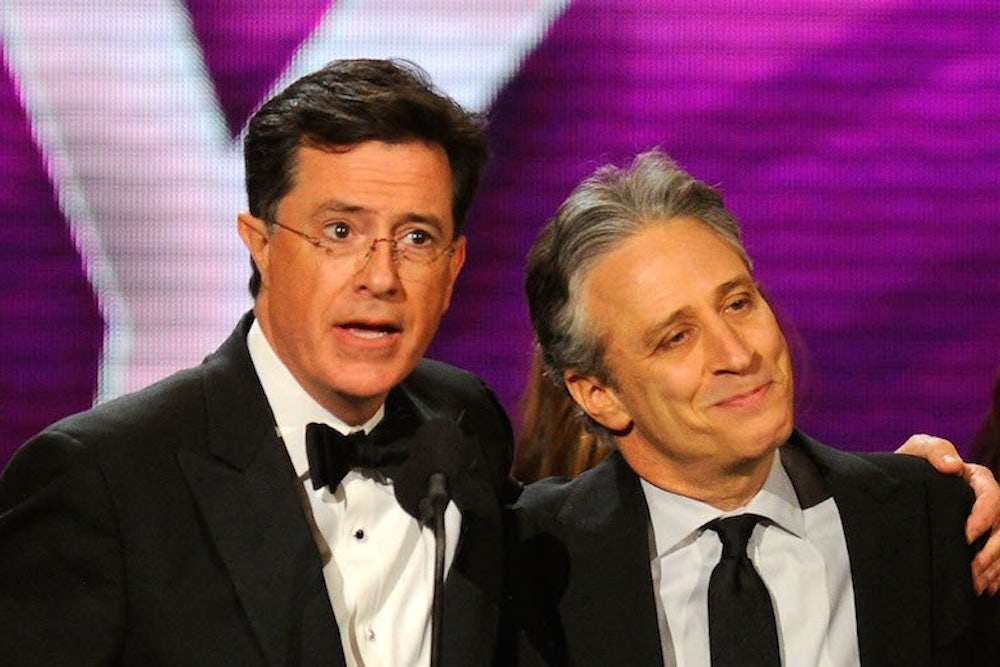Politics is a dreary, dreadful business. Anyone who spends much time submerged in the world of political affairs knows this. But, chances are, this breed of person also knows a variety of other things, too: how elections work (both the official story and the money-flushed reality); how policies are constructed and enacted (from the bill sittin’ on Capitol Hill to the vexing world of enforcement); and how various policy programs function. If all that is too complicated and too bleak, there is a more cheerful way to get informed: watching comedians joke about the news.
Judging by a recent Atlantic piece by Megan Garber, comedians have become, over the last several years, some of America’s foremost public intellectuals, guiding our understanding of matters political, religious, and social. “Comedians have taken on the role of public intellectuals,” Garber writes. “They’re exploring and wrestling with important ideas. They’re sharing their conclusions with the rest of us.” Her observation is astute: Especially among the young, Stephen Colbert and Jon Stewart are revered as intellectual leaders and trusted sources of information about the world. No longer must one sift through the challenging work of thinkers like Noam Chomsky, Steven Pinker, Susan Sontag, or Cornel West to interpret important issues: After all, their work is often dense and sophisticated, which might lead someone to suspect they have something to learn. Instead, intrepid citizens can now turn to simpler, more upbeat sources of information wherein satirical monologues getting progressively louder and more frantic take the place of long, boring essays.
This is perhaps why young Americans don’t know anything about politics, exhibiting disastrously diminished understanding of current events compared to our older counterparts. Herein lies the primary problem with electing court jesters as thinkers-in-chief: Comedy, subversive as it has the potential to be, is entertainment. And entertainers, unlike tenured professors and think-tank fellows, rely on mass adulation to remain gainfully employed. This means that Stewart, Colbert, and the rest of their ilk have a special motivation to flatter their audiences: They’re not here to teach, after all, but to win some laughs and get good ratings.
“The ultimate ethos of [Stewart and Colbert’s] television programs is this,” Steve Almond wrote in a 2012 . “[T]he customer is always right … Their clever brand of pseudo-subversion guarantees a jolt of righteous mirth to the viewer, a feeling that evaporates the moment their shows end.” But that level of flattery (congratulate yourself—you’re getting the joke!) combined with the rush of laughter and the sense of having become informed produce a heady, addictive sensation. How to score another hit? Perhaps the most obnoxious example is the 2010 “Rally to Restore Sanity and/or Fear,” a Stewart-Colbert traveling show premised on the idea that everything that occurs to you by way of milquetoast liberal common sense is gospel, and that play-acting a political rally advances… something. Back in 2010, journalist Mark Ames called the gathering the “Rally to Restore Vanity,” which was a better descriptor, but alas, not the kind that surges high on the laugh-o-meter.
Aside from its tendency to affirm its audience’s pre-conceived notions about morality and politics in order to win their views and wallets, comedy-as-intelligentsia tends to linger in the radical center for similar reasons. Garber points out that comedy has the potential to be genuinely subversive, and this is true: In the age of medieval fools, excoriating monarchial or church power was legitimately dangerous, and contrary to the sensibilities of most. But today’s mass-marketed comedy tends only to tease at genuine subversion, while making commonly held views—Those clowns in Congress! Those hypocritical suits on Fox!—the meat of its act. Mistaking gentle jokes about Republicans for subversiveness is dangerous because it convinces those in the center that they’re on the vanguard, which severely delimits their view of the range of political possibilities. Contrary to the thrust of safe cracks about political extremes, "common-sensical and obvious" is not always better.
It seems unlikely that public intellectuals without staffs of bit writers will ever out-compete those with them in the bid for public attention. If that is the case, and comedians are our new public intellectuals, we have made a sorry trade. But don’t worry: The worn-out deck jokers of Comedy Central will laugh it off in no time.
